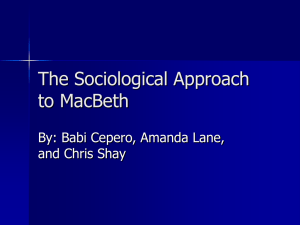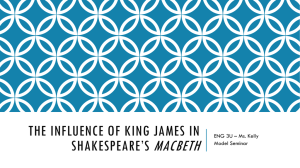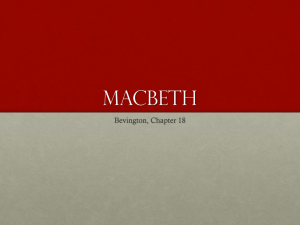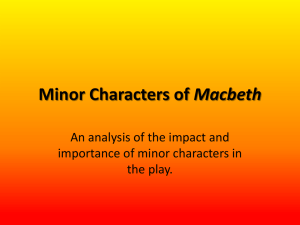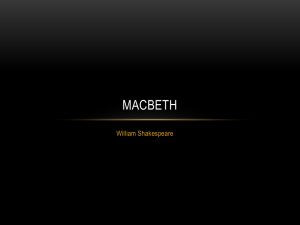History of Macbeth
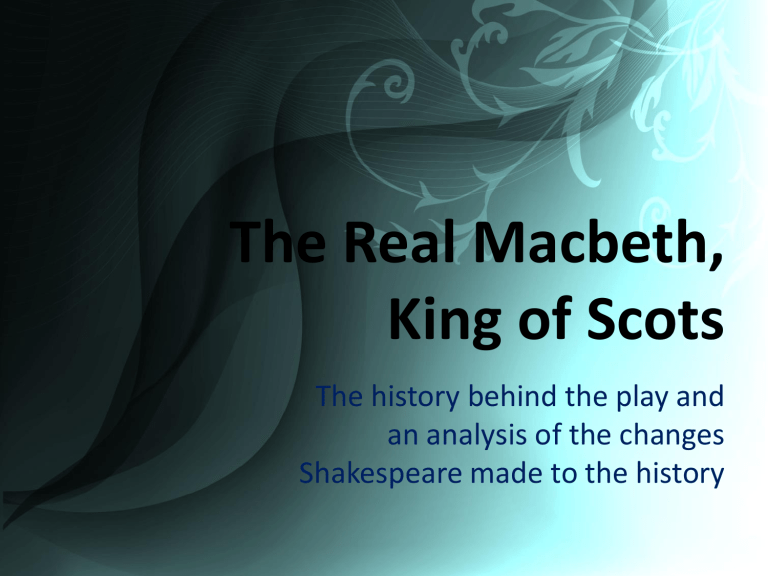
The Real Macbeth,
King of Scots
The history behind the play and an analysis of the changes
Shakespeare made to the history
Macbeth (c.1005 - 1057)
Mac Bethad mac Findláich, known in English as
Macbeth, was born in around 1005.
In August 1040, he killed the ruling king, Duncan I, in battle near Elgin,
Morayshire. Macbeth became king.
• For 14 years, Macbeth seems to have ruled equably, imposing law and order and encouraging Christianity.
• In 1050, he is known to have travelled to
Rome for a papal jubilee.
• He was also a brave leader and made successful forays over the border into
Northumbria, England.
• In 1054, Macbeth was challenged by Siward,
Earl of Northumbria, who was attempting to return Duncan's son Malcolm Canmore, who was his nephew, to the throne.
• In August 1057, Macbeth was killed at the
Battle of Lumphanan in Aberdeenshire by
Malcolm Canmore (later Malcolm III).
• Shakespeare's Macbeth bears little resemblance to the real 11th century Scottish king.
Shakespeare’s Sources
• Shakespeare's chief source for Macbeth was
Holinshed's Chronicles
(Macbeth), who based his account of Scotland's history, and Macbeth's in particular, on the
Scotorum Historiae, written in 1527 by
Hector Boece.
• Other minor sources contributed to
Shakespeare's dramatic version of history, including
Reginald Scot's
Discovery of
Witchcraft , and
Daemonologie , written in 1599 by
King James I.
Shakespeare’s Macbeth
• It can be argued that the changes Shakespeare has made to the original information serve three main purposes:
– the dramatic purpose of producing a more exciting story than is found in the sources;
– the thematic purpose of creating a more complex characterization of Macbeth;
– and the political purpose of catering to the beliefs of the reigning monarch, King James the First.
And, in the grander scheme, Shakespeare’s alterations function to convey the sentiment echoed in many of his works – that there is a divine right of kings, and that to usurp the throne is a nefarious crime against all of humanity.
The Divine Right of Kings
• In Shakespeare’s time, it was believed that the
King was divinely chosen by God.
• As God’s chosen representative on earth, the King was the supreme upholder of order on earth.
• If his position was violated it would destroy the perfect order in the universe and bring strife and chaos to the world.
• Any act of treason or treachery against the King was considered indirectly to be a mortal sin against God. The penalty was death.
Macbeth: The Changes
• In Holinshed’s Chronicles, Macbeth is introduced as a valiant gentleman, and, as in
Shakespeare’s play, Macbeth is sent by King
Duncan to crush the rebellion led by
Mackdonwald.
• Shakespeare made some alterations to make his entrance into the play more effective.
• Our first impression of Macbeth must be one of grandeur; he must command our attention at once for what occurs in the rest of the play to be significant.
Literary Significance
• As a brave warrior and leader, Macbeth is capable of taking others’ burdens upon himself. Our awareness of the strength and assuredness Macbeth possesses early in the drama is important when we later witness his downfall and mental decay to the point where he is not capable of handling even his own burdens.
• To assist in his more complex interpretation of
Macbeth, Shakespeare had to move outside of
Holinshed’s account which gives no real analysis of Macbeth’s character or motivation.
• Shakespeare turned to George Buchanan’s Rerum
Scoticarum Historia, and to other previous passages in Holinshed’s own work. Buchanan relays the following:
– ‘Macbeth was a man of penetrating genius, a high spirit, unbounded ambition, and , if he had possessed moderation, was worthy of any command however great; but in punishing crimes he exercised a severity, which, exceeding the bounds of the laws, appeared apt to degenerate into cruelty.’
• Shakespeare deviates from Buchanan’s depiction of Macbeth as a cruel, barbarous man, a notion also put forth by Holinshed.
• Despite the murders Macbeth will commit,
Shakespeare presents him as a gentle, thoughtful man who can love wholeheartedly, as we see in his interactions with his wife.
• Lady Macbeth herself illustrates that
Macbeth’s nature is “. . . too full o’ th’ milk of human kindness”(Act 1, scene 5)
Real witches?
• There is debate about whether or not there were real witches in the original history of Macbeth.
• Holinshed's Chronicles does mention the meeting with “...three women in strange and wild apparell, resembling creatures of elder world, whome when they attentiuelie beheld, woondering much at the sight, the first of them spake and said: "All haile,
Makbeth, thane of Glammis....“
• Shakespeare clearly took his first witch scene from this episode.
• There is however no historical evidence supporting Holinshed's account nor of any involvement of the Kings of Scotland at that time
(the 11thC AD) with witchcraft or pagan religion of any sort.
• All the evidence we have suggests that MacBeth was an orthodox Catholic; which did not prevent him taking a full part in the bloody family and national feuds of the period.
Shakespeare’s witches
• Notable changes are also made by Shakespeare in his depiction of Holinshed’s three weird sisters, and it is apparent that the alterations are implemented partially to instill trepidation in the audience.
• Holinshed’s sisters are
“creatures of the elderwood
... nymphs or fairies”
(Chronicles 268).
• Nymphs are generally regarded as goddesses of the mountains, forests, or waters, and they possess a great deal of youthful beauty.
• And similarly, fairies are defined as enchantresses, commonly taking a small and dainty human form.
• Holinshed’s illustration of the creatures
Macbeth chances upon is far removed from the portrayal Shakespeare gives us through
Banquo:
– “What are these, so wither’d and so wild in their attire, that look not like th’ inhabitants o’ th’ earth…” (Act 1, scene 3)
• Shakespeare transforms the weird sisters into ugly, androgynous hags, and they distinctly take on a more sinister role than was assigned to them in
Holinshed’s Chronicles.
Literary Significance
• Shakespeare’s hags, fascinating and frightening, appeal to our interest in the demonic supernatural.
• Most people do not believe in fairies, but many acknowledge the presence of evil in our world.
• A known believer in witchcraft during the time
Shakespeare was writing Macbeth was King
James himself.
• It is probable that Shakespeare took into account his monarch’s position regarding witches when he altered the portrait of the weird sisters in
Holinshed’s work, thus capitalizing on the opportunity to subtly acknowledge and please
King James.
• Shakespeare's reshaping of Holinshed's weird sisters also performs the thematic function of introducing a significant presence of evil with which Macbeth is confronted.
• The malignant hags are the primary reason for our ability to feel true sympathy for Macbeth despite his heinous crimes.
Banquo…really so innocent?
• In Macbeth, the role and characterization of
Banquo differs considerably from Holinshed's
Chronicles.
•
In both texts, Banquo initially is a noble soldier fighting along side Macbeth.
• However, Holinshed reports that Banquo becomes an accomplice in the murder of King
Duncan:
– “At length therefore, communicating his purposed intent with his trustie friends, amongst whome
Banquo was the chiefest, upon confidence of their promised aid, he slue the King...”(Chronicles, 269).
• In contrast, Shakespeare presents Banquo as being noble and good throughout the play, unaware of the ominous plot concocted by Macbeth and his Lady.
• Shakespeare's alterations transform the murder of
Banquo into a caustic and loathsome act; a tragic edisode which heightens the emotional state of the audience.
• As with most of the changes implemented by
Shakespeare from the original source, Banquo's portrayal serves all three purposes: dramatic, thematic and political.
Literary Significance
• In addition, the play is far more effective with the villainy limited to Macbeth and Lady Macbeth alone.
• The good and honourable Banquo is also crucial to the
thematic issues of evil and its influences upon mortal men. Shakespeare's Banquo is a voice of reason and wisdom that warns Macbeth:
– “But 'tis strange: and oftentimes, to win us to our harm, the instruments of darkness tell us truths, win us with honest trifles to betray's In deepest consequence.” (Act 1, scene 3)
• Banquo's ability to resist the forces of darkness 'points up Macbeth's failure to resist, and stresses his tendency towards evil, the flaw that makes the tragedy possible' (Boyce, 48).
Finally… King Duncan
• The changes he makes to King Duncan and the events surrounding Duncan's death, work for dramatic and thematic effects, but also serve to illustrate Duncan's virtues, and to emphasize the cataclysmic severity of killing the monarch.
• Shakespeare changes the King
Duncan found in Holinshed's
Chronicles into a respected and ideal leader.
• Shakespeare has not only changed the attributes of Holinshed's King Duncan, he has also altered the events surrounding Duncan's murder.
• In the Chronicles Duncan is killed in battle by
Macbeth and Banquo.
• In Macbeth Duncan is murdered in his sleep by Macbeth.
Literary Significance
• Thematically, Duncan's goodness allows
Macbeth's feelings of guilt to surface, and become momentous, thereby enhancing the complex characterization of Macbeth.
• Being a soldier, Macbeth has killed many a man in battle without feeling greatly perplexed. His feelings about killing a corrupt or incompetent king would probably not be much more upsetting to Macbeth -- he would see it as a just action.
• However, Shakespeare's portrayal of Duncan as a gentle, compassionate, trusting, and magnificent monarch, presents a tangible reason why Macbeth has a tormented conscience. And subsequently, this conscience, which is the backbone of
Macbeth's complexity, can be fully explored.
Duncan's characterization enables us to believe Macbeth is racked with guilt.
• Not only does Shakespeare's depiction of
Duncan serve a dramatic and thematic purpose, but one could argue that it also illuminates Shakespeare's attitude towards the killing of a rightful ruler.
• A divinely appointed monarch has been assassinated, and it is a calamity of such epic proportion that even the workings of nature are disrupted.
• Presenting Duncan's murder in this way diminishes Macbeth's place in the grander scheme of the play
• Macbeth and his Lady are relegated to mere player status -- they become, if only briefly, instruments whose crime against all of humanity has surpassed their collective motive of ambition; they have done a deed of apocalyptic consequence. Through them evil has been unleashed, and it has destroyed
God's beloved.


